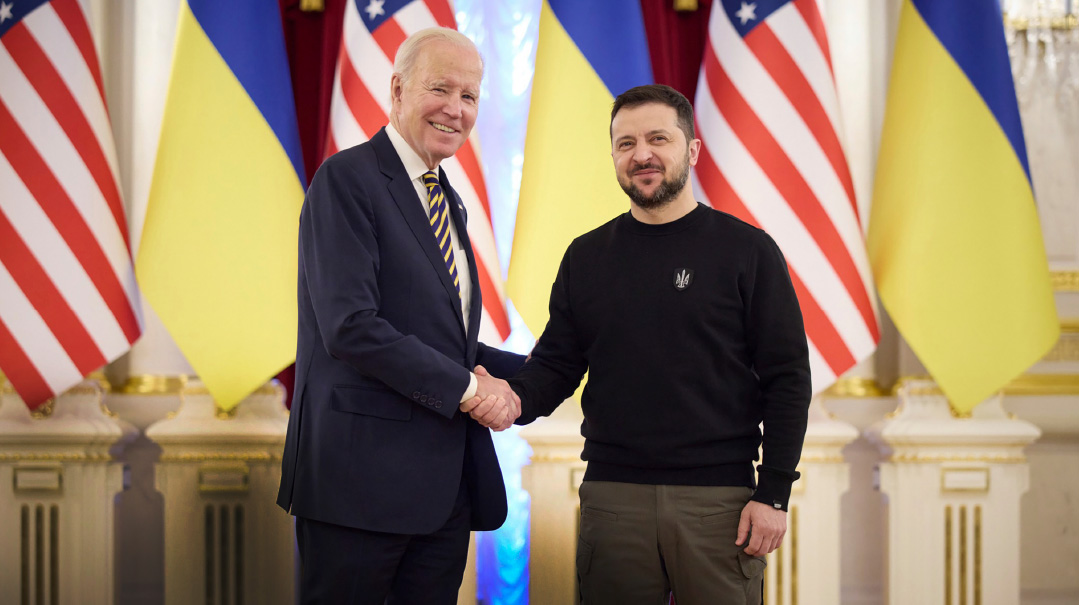Ukraine, the New Israel

Ukraine is emerging as a new consensus that highlights the growing frailty of Israel’s own position

Photo: AP Images
One hundred and fifty years after Mark Twain left his adopted Manhattan to lob insults at the place I grew up in (“I would like to live in Manchester, England — the transition between Manchester and death would be unnoticeable”), I found myself paying a return visit with a newcomer’s eyes.
A jetlagged, early-morning stroll through Midtown took in the route of the Israel Day Parade, which had wrapped up the night before. Along Fifth Avenue, nary a scrap of blue and white remained. But the walk triggered an epiphany about the uniqueness of America-Israel ties, and an emerging threat to that vital relationship that has become obvious through the Ukraine war.
It might not be obvious to a New Yorker, but the very existence of the Israel Day Parade is incredible, in the literal sense. In which other country does the hub of financial, corporate, and media power close down to celebrate Israel?
Certainly not in Europe, where the consensus is a lot less friendly to the Jewish country. From London to Berlin, one would be far more likely to see a “Free Palestine” placard than an Israeli flag. Even if there was another country — say Britain — with such high levels of popular support, would it even matter? America is a superpower, and that’s why the warm feelings for Israel matter.
That points to something deeper about the American-Israeli relationship that doesn’t often get a look in. For the ma’amin sensitive to the message of history, there’s something unique at play in American support.
Since its founding, Israel has had a string of patrons who came through at the critical moments. Back in 1948, there was a brief window of time when Stalin supported the creation of Israel, viewing it as an anti-colonial project that would weaken the British Empire.
Shortly after the War of Independence, Stalin abruptly reversed his support, and reverted to his own natural anti-Semitic inclinations. Soviet policy remained resolutely anti-Israel until the collapse of the USSR — but no matter, since Israel was a fact.
Shortly thereafter, France under De Gaulle emerged as a patron, providing the Israelis with advanced jets that proved their worth in the Six Day War, and nuclear know-how that enabled the development of the ultimate deterrent against Arab hostility.
When, under Arab pressure, the French leader fell in line with the Muslim world and cut off the arms supplies, Israel was left adrift for a few years.
But then, reeling from the Arab assault on Yom Kippur, Israel gained an even more powerful protector: America. With his own need to project strength amid the Watergate crisis, President Nixon ordered a resupply effort for Israeli arms, and the relationship has only deepened over time.
Without touching Israel’s exact hashkafic status, can there be any doubt that the largest Jewish community in the world — one gathered, moreover, in its ancient homeland — has been showered with a near-miraculous display of Hashgachah? Israel’s special relationship with the only country in the world that really matters is something to be grateful for — and to worry about.
All of that is by way of introduction to the trend that is now too obvious to deny. If the bedrock of the relationship is its bipartisan nature, Israel is in trouble. Growing Democratic skepticism is an old story — what’s new is the way that Ukraine is emerging as a new consensus that highlights the growing frailty of Israel’s own position.
Barring MAGA Republicans, both parties are in agreement that Ukraine’s fight must be sustained, and that the US should be ready to foot the bill. Hence, Mike Pence’s visit to Kyiv and renewed declarations of support last week.
When it came to Iran, things got disturbing, though. Earlier in the summer, the Biden administration messaged that due to Iranian support for Russia in the proxy war in Ukraine, any hope of a renewed nuclear deal was up. As I noted at the time, the subtext was worrying: Ukrainian positions were taken into account; Israeli assertions that the deal was an existential threat could be safely ignored.
Since then, as the administration has ratcheted up talk of a new deal — again over Israel’s head — the relative standing of Israel and Ukraine have only diverged.
In a blatant act of political interference because of the ongoing judicial reforms, the White House has snubbed Bibi by withholding an invitation to visit, instead extending its hand to President Herzog.
In parallel, Ukraine’s ambassador to Israel Yevgen Korniychuk — who’s waged a long campaign to get Israel to arm Kyiv — stirred the pot. After Israeli foreign minister Eli Cohen indicated that Netanyahu was considering visiting Ukraine — which would amount to an open break with Russia — Korniychuk said that “the fastest way to the White House definitely passes through Kyiv.”
That is likely bluster, but even the possibility that Israel needs another country to open the West Wing door for it is ominous, because it reverses the paradigm wherein Israel’s access to the levers of DC power magnifies the small country’s clout.
None of this is to belittle American support for Israel. Resounding bipartisan majorities regularly vote for support for items like the Iron Dome, for example. Those blue and white flags will flutter over Fifth Avenue next year, and the marching bands and VIPs will show up again.
But the warmth of the Biden administration’s embrace of Ukraine — contrasting with the cool response to Israel’s leader — is a chilly wind that bodes no good.
Sallah Shabati Rides Again
What do park benches and local elections have in common? Ordinarily, not much; when they’re in Ramat Beit Shemesh, it seems, quite a lot.
A few weeks ago, the honest burghers of RBS awoke to find municipal workers giving their streets a facelift. Saplings were being planted in sidewalks long bereft of trees. Wooden benches too sun-warped to sit on had disappeared in favor of shiny new metal ones. Even long-abandoned local parks were getting new grass and play sets.
It didn’t take a genius to connect the dots: With elections pending, Mayor Aliza Bloch had suddenly found a hitherto unsuspected pot of gold somewhere in City Hall.
Politicians by nature practice politics, but there are more and less elegant ways to play the game. As Sallah Shabati — Chaim Topol’s world-weary Moroccan immigrant who witnesses the same KKL trees being replanted for the benefit of a stream of gullible American donors — might have pointed out, this particular tree-planting blitz falls firmly in the latter category.
There’s something vaguely amusing about the blatant politicking; as if Beit Shemesh were too provincial to justify anything like finesse in backroom dealings.
Of course, it’s not as if only the incumbent practices machine politics; the chareidi parties in opposition to Bloch do a fine job of it too. Local elections are anything but local; rather each city is an outpost in the Great Game of national politics between the rival chareidi parties.
For Degel HaTorah to win Bnei Brak, they need to give something to Shas in Elad, which means that Beitar falls to Agudah or they risk unraveling agreements that have held for two decades in Modi’in Illit with fatal consequences for the Jerusalem City Council, and the third secretary’s position in Teveria.
The depressing upshot is that local elections are not about holding anyone accountable for failing to collect the garbage or provide enough classrooms, but about maintaining a national balance of power.
To be fair, Israeli politics has come a long way from the smoke-filled-room, askanic nightmare of yore. A neighbor of mine who made aliyah with a group of Americans in the ’80s to found a yishuv recalls his disbelief on being told that the party who had sponsored the collective’s founding expected, as a matter of course, to receive 100 percent of the local vote.
Until Menachem Begin broke the stranglehold of the left-wing Mapai-Labor Party in 1977, the political machine founded by Ben Gurion ensured its dominance by the simple expedient of denying jobs to anyone who supported a rival.
So, in the evolution of Israeli politics, things are definitely looking up — it’s a case of slowly does it. One of these days, we may get a local election in which local issues actually come first. Until then, let’s be thankful that elections exist at all — after all, park benches don’t grow on trees.
(Originally featured in Mishpacha, Issue 968.
Oops! We could not locate your form.







